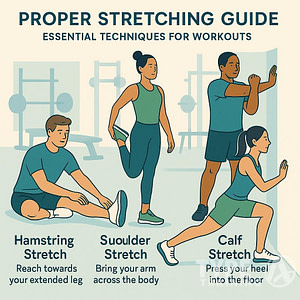Unlocking your fitness potential goes beyond just spending hours at the gym. An often overlooked factor is sleep, which plays a critical role in muscle recovery and overall progress towards your fitness goals.
By optimizing your sleep quality and duration, you enhance muscle recovery, boost hormonal balance, and improve athletic performance. This holistic approach ensures you make the most of your efforts in physical training.
Your body’s ability to recover and grow stronger after workouts relies heavily on adequate rest.
Popular posts:
Sleep impacts muscle recovery by facilitating protein synthesis and releasing growth hormones, essential processes for building muscle.
Lack of proper sleep can hinder these processes, delaying your progress and increasing the risk of injury.
Ensuring you get enough rest not only accelerates recovery but also helps maintain peak mental focus during workouts.
Incorporating strategies to improve sleep can lead to significant fitness gains.
Prioritizing sleep hygiene—such as maintaining a regular sleep schedule, creating a restful environment, and limiting late-night caffeine consumption—can contribute to better sleep quality.
By understanding the vital connection between sleep and fitness, you can take actionable steps to optimize your recovery, allowing you to achieve your athletic goals more effectively.
Physiological Role of Sleep in Muscle Recovery
Sleep plays a crucial role in facilitating muscle recovery by regulating growth hormone and testosterone levels, as well as managing inflammation. These processes contribute significantly to muscle repair and growth.
Growth Hormone and Testosterone Release During Sleep
During sleep, particularly in the stages of slow-wave sleep, growth hormone and testosterone levels peak.
Growth hormone is vital for stimulating tissue growth and muscle repair.
Testosterone supports muscle protein synthesis, enhancing muscle recovery.
The rhythmic release of these hormones during sleep promotes an optimal environment for muscle growth and recovery.
Ensuring sufficient sleep duration and quality is crucial to maintaining these hormonal cycles and supporting athletic performance.
Inflammatory Response and Muscle Repair
Sleep modulates inflammation and facilitates muscle repair following damage.
Post-exercise, your body triggers an inflammatory response to repair muscle fibers.
Sleep aids in regulating this inflammatory response, controlling local inflammation, and enhancing muscle recovery processes.
Proper sleep can minimize excessive inflammation, thereby expediting recovery and reducing muscle soreness.
Adequate rest ensures that inflammation is managed effectively, allowing for efficient muscle repair and improved adaptation to training.
Sleep’s Impact on Athletic Performance
Sleep plays a crucial role in enhancing athletic performance by influencing endurance, strength, and neuromuscular function. Sleep deprivation, on the other hand, can significantly impair these areas, leading to increased fatigue and slower reaction times.
Endurance, Strength, and Neuromuscular Function
Quality sleep significantly impacts endurance, strength, and neuromuscular function.
During sleep, your body undergoes processes vital for muscle repair and growth, helping improve overall physical performance.
Adequate sleep facilitates protein synthesis and muscle recovery, leading to increased muscle strength and improved endurance.
Neuromuscular function, which includes coordination and reaction times, is also optimized when well-rested.
Athletes with sufficient sleep experience quicker reaction times and are better able to execute complex movements.
Prioritizing sleep can result in improved athletic performance, as seen in comprehensive studies linking sleep with better physical capabilities and decreased injury risk.
Effects of Sleep Deprivation on Performance
Sleep deprivation can have detrimental effects on your physical performance.
It increases fatigue, decreasing your endurance and muscle strength while negatively impacting neuromuscular function.
Without enough rest, you may notice slower reaction times and diminished coordination, which can hinder overall athletic performance.
Research highlights how lack of sleep compromises both mental and physical aspects, raising the risk of injury and reducing proficiency in executing athletic tasks.
Visit this study for more on managing sleep for optimized athletic results.
It’s clear that maintaining a regular sleep schedule is vital for maximizing your athletic potential and ensuring optimal performance levels.
Optimizing Sleep for Muscle Growth
To effectively promote muscle growth, it’s essential to consider both adequate sleep duration and the synergy between sleep and nutrition. Prioritizing these elements can significantly enhance muscle recovery and optimize fitness gains.
Importance of Sleep Duration
Adequate sleep duration is crucial for muscle recovery and growth.
During sleep, particularly in deep sleep cycles, your body releases growth hormone, which plays a key role in tissue repair and muscle growth.
Aim for 7-9 hours of quality sleep per night to allow these essential processes to occur.
Lack of sufficient sleep can lead to increased levels of cortisol, a stress hormone that can break down muscle tissue and hinder muscle growth.
Consistent, restful sleep helps maintain hormonal balance, reducing cortisol levels and promoting an environment conducive to muscle repair and growth.
A regular sleep schedule also plays a significant role in maintaining optimal muscle glycogen levels.
Sleep affects how your body processes and stores glycogen, which is essential for energy during workouts.
Ensure you have a consistent bedtime and wake-up time to help regulate these processes.
Nutrition and Sleep’s Synergy for Muscle Growth
Nutrition and sleep are interconnected factors in maximizing muscle growth.
Pre-sleep protein ingestion, such as 40 grams of casein or whey protein, can enhance muscle recovery by providing a steady supply of amino acids throughout the night.
This approach has been supported by studies focusing on muscle recovery and sleep improvement.
Ensure you’re consuming balanced meals rich in carbohydrates, proteins, and healthy fats to support muscle glycogen storage and overall muscle mass development.
Carbohydrates consumed before bed can replenish glycogen stores, while proteins repair and build muscle tissue during sleep.
Hydration is another crucial aspect of this synergy.
Proper fluid intake supports cellular functions necessary for muscle repair and growth.
Aim to stay well-hydrated throughout the day, but consider reducing fluid intake just before bed to minimize sleep disruptions.
Sleep Strategies for Recovery and Performance
Incorporating effective sleep strategies can significantly enhance your recovery and performance. Understanding how sleep can be optimized through different techniques and interventions is crucial for achieving fitness gains.
Sleep Extension and Napping
Sleep extension involves increasing your total sleep time beyond your usual pattern.
Athletes can benefit from obtaining more than the usual 7-9 hours recommended for adults. This approach can help alleviate accumulated sleep debt, leading to enhanced physical performance and mental acuity.
Napping is another effective strategy.
Short naps, typically 20-30 minutes, can improve alertness and reduce fatigue.
Longer naps can promote deeper sleep stages, providing more substantial recovery benefits.
However, it’s important to avoid long naps late in the day to prevent interference with nighttime sleep patterns.
Sleep Interventions and Aids
Several sleep interventions and aids can support better sleep quality for recovery.
Practices such as relaxation techniques, including meditation and deep breathing exercises, can help you wind down before bed, promoting better sleep onset.
Supplements like melatonin and magnesium can also be beneficial.
Melatonin helps regulate the sleep-wake cycle and can be particularly effective during travel-induced disruptions.
Magnesium aids in muscle relaxation and may improve sleep quality.
It’s advisable to consult with a healthcare provider before starting any supplement regimen to ensure safety and efficacy.
Practical Guidelines for Athletes and Active Individuals
To optimize your fitness journey and enhance muscle recovery, focus on customized sleep strategies and effective monitoring of your sleep patterns. These practical steps will guide you toward better rest and improved athletic performance.
Customized Sleep Recommendations
For athletes, particularly those in demanding sports like soccer and rugby, consistency is key.
Aim for a regular sleep schedule that aligns with your training sessions and competitions.
The American Academy of Sleep Medicine suggests adults aim for 7-9 hours of sleep, while elite sport participants may require more.
Adjust your bedtime based on personal needs and stress levels.
Consider the quality of sleep, not just quantity.
Create an environment conducive to restful sleep; dim lighting, comfortable beddings, and a cool room temperature aid hormonal regulation and longevity. In the context of fitness, quality sleep helps with performance and recovery.
Key Tips:
- Regular sleep schedule
- Quality sleep environment
- Individualize sleep duration
Monitoring and Evaluating Sleep Patterns
Evaluating your sleep patterns is crucial for understanding their impact on performance.
Utilize tools like sleep diaries or apps to track your rest quality and duration.
Analyzing these patterns helps identify disturbances that may hinder recovery and fitness gains.
Tracking can enhance awareness of how activities affect sleep, thereby promoting better choices.
Patterns amongst elite sports participants, such as those in rugby or soccer, often reveal the importance of pre-sleep routines.
Evaluate your sleep quality regularly and adjust habits accordingly for optimal recovery and performance.
Essential Actions:
- Use sleep tracking tools
- Regularly assess sleep quality
- Adjust routines based on insights
Frequently Asked Questions
Adequate sleep is essential for muscle growth and athletic performance. Understanding sleep’s impact on training can optimize recovery and results.
What is the recommended amount of deep sleep for optimizing muscle growth?
Deep sleep is crucial for muscle recovery and growth. Aim for 1.5 to 2 hours of deep sleep each night.
This stage is when the body repairs tissues and releases growth hormones vital for building muscle.
What are the effects of sleep duration on athletic performance and recovery?
Sleep duration significantly impacts athletic performance and recovery.
Getting 7-9 hours per night ensures your body has enough time to repair and strengthen muscles.
Insufficient sleep can hinder recovery and reduce overall performance.
What is the best time to go to sleep to maximize muscle recovery?
Going to bed between 10 p.m. and midnight aligns with the body’s natural circadian rhythms.
This timing can enhance recovery and performance by ensuring you receive adequate rest before physical activity.
Can the position in which you sleep affect the quality of muscle recovery?
Your sleep position can influence recovery quality.
Sleeping on your back or side is generally recommended to support spinal alignment and reduce muscular tension.
Poor positioning may lead to discomfort and hinder recovery.
How crucial is rest and recovery in an athlete’s training regimen?
Rest and recovery are vital components of an athlete’s training regimen.
They allow muscles to repair and grow, preventing overtraining and injuries.
Prioritizing recovery can lead to significant improvements in performance.
What have studies shown about the relationship between sleep and muscle development?
Studies have shown that sleep positively affects muscle development. It does this by promoting protein synthesis and preventing muscle breakdown.
For instance, sleep can help prevent muscle breakdown and promote fat loss. This can enhance your fitness progression.













